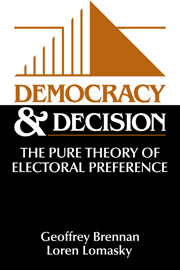Book contents
- Frontmatter
- Contents
- Preface
- 1 Ethics, politics, and public choice
- 2 The logic of electoral choice
- 3 The nature of expressive returns
- 4 The analytics of decisiveness
- 5 The theory of electoral outcomes: implications for public choice theory
- 6 From anecdote to analysis
- 7 Interpreting the numbers
- 8 Consensus, efficiency, and contractarian justification
- 9 Paternalism, self-paternalism, and the state
- 10 Toward a democratic morality
- 11 Constitutional implications
- Bibliography
- Index
10 - Toward a democratic morality
Published online by Cambridge University Press: 05 June 2012
- Frontmatter
- Contents
- Preface
- 1 Ethics, politics, and public choice
- 2 The logic of electoral choice
- 3 The nature of expressive returns
- 4 The analytics of decisiveness
- 5 The theory of electoral outcomes: implications for public choice theory
- 6 From anecdote to analysis
- 7 Interpreting the numbers
- 8 Consensus, efficiency, and contractarian justification
- 9 Paternalism, self-paternalism, and the state
- 10 Toward a democratic morality
- 11 Constitutional implications
- Bibliography
- Index
Summary
A phenomenon noticeable throughout history regardless of place or period is the pursuit by governments of policies contrary to their own interests. Mankind, it seems, makes a poorer performance of government than of almost any other human activity. In this sphere, wisdom – which may be defined as the exercise of judgment acting on experience, common sense and available information – is less operative and more frustrated than it should be. Why do holders of high office so often act contrary to the way reason points and enlightened self-interest suggests? Why does intelligent mental process seem so often not to function?
Barbara Tuchman, The March of FollyBy the people?
Democracy, so the popular maxim assures us, is government of the people, by the people, for the people – and it is unique among political regimes in being so. In this chapter we seek to interrogate that species of democratic piety. To be more precise, we shall question two-thirds of it. That democracy is government of the people is hardly to be denied. But this is not what makes democracy unique: All functioning political regimes govern “the people.” It is rather democracy's status as rule by the people and for the people that is the distinctive core of the democrat's faith.
The two elements – the by-ness and for-ness – are not unrelated. Although government for the people by a beneficent elite is a conceptual possibility, it is a highly improbable one.
- Type
- Chapter
- Information
- Democracy and DecisionThe Pure Theory of Electoral Preference, pp. 167 - 198Publisher: Cambridge University PressPrint publication year: 1993



